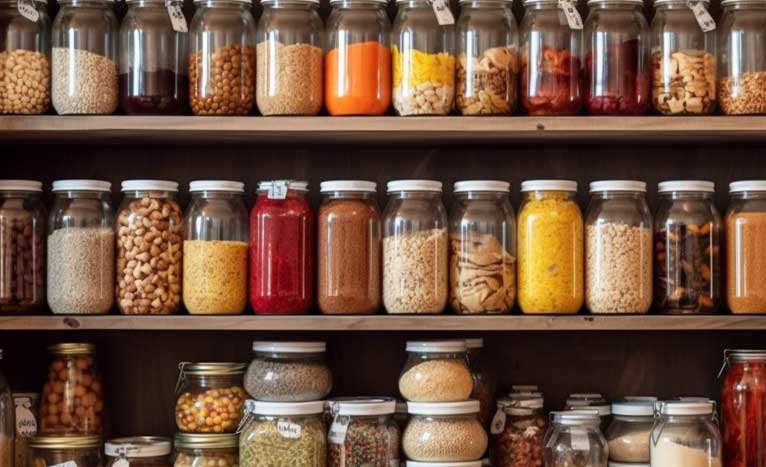In an emergency situation, having a supply of non-perishable foods can mean the difference between survival and starvation. Whether you're preparing for a natural disaster, a job loss, or any other emergency situation, having a stockpile of long-lasting foods can provide peace of mind and ensure your family's survival. In this blog, we'll discuss the top 10 survival foods to store and provide tips for emergency food storage.
I have been building a food storage for years now, and I have learned what works and what does not. To make things simple, I went through my food storage and pondered what would be the best 10 foods to stock up on in an emergency. What would I tell my family and friends? What would I tell people who are just starting to build a food storage?
For all of these items listed, it is important to be able to have means to prepare them even if you don’t have power. If the power grid goes down, how will you cook your food? Ensure that you have alternative cooking methods like gas stoves or generators to power your cooking.
The Top 10 Survival Foods to Store

1. Rice
Rice is a staple food that should be included in any emergency food supply. It's high in carbohydrates and provides essential nutrients like magnesium and potassium. Rice can be stored for up to 30 years if stored properly, making it an ideal choice for long-term emergency food storage.

2. Beans
Beans are a great source of protein and fiber, making them an essential part of any emergency food supply. They can be stored for up to 30 years if stored properly and can be cooked in a variety of ways, making them a versatile and nutritious option.

3. Canned Meat and Fish
Canned meat and canned fish are a great source of protein and can be stored for several years. They're also easy to prepare and require no refrigeration, making them ideal for emergency food storage.
I love to have canned meat on hand because I can easily use it in recipes and don’t have to worry about cooking up a chunk of meat that needs thawed or something else. Canned meat is an incredible thing to have on hand in your food storage!

4. Dried Fruits and Nuts
Dried fruits and nuts are a great source of energy and essential nutrients like fiber and protein. They can be stored for several years and provide a quick and easy snack for emergencies.
It is a good idea to have individual packs of the fruits and nuts so you can throw them into your bug out bags or emergency car kits and have them ready to go. They make great snacks for kids as well!
If you want to make your own dried fruits, you can invest in a dehydrator to make dried fruits and fruit leather.

5. Peanut Butter
Peanut butter is a high-calorie food that provides essential nutrients like protein and healthy fats. It can be stored for up to five years and can be eaten alone or used as a spread on crackers or bread.
This is a snack food that even kids will like to have in your emergency food storage. It is easy to make peanut butter and jelly sandwiches or to have plain with other items in your storage. I have crates of peanut butter in my food storage.

6. Whole Grain Cereal
Whole grain cereal is a great source of fiber and essential nutrients like iron and magnesium. It can be stored for up to a year and can be eaten alone or with milk or yogurt.
With cereal, you can store it in mylar bags for long term food storage. It is great to store your favorite cereals in mylar, so in an emergency you can pair them up with powdered milk to enjoy cereal!

7. Powdered Milk
Powdered milk is a great source of calcium and can be used in a variety of recipes. It can be stored for up to 20 years if stored properly and can be reconstituted with water when needed.
I love having powdered milk in my food storage because even when I am out of milk I can go and grab powdered milk and use it in recipes after I rehydrate it. It comes in handy more times than not!

8. Pasta
Pasta is a versatile and filling food that can be stored for up to two years. It's a great source of carbohydrates and provides essential nutrients like iron and fiber.
Pasta can be stored in mylar bags with oxygen absorbers to last up to 20 years! This is a great idea if you find pasta on sale or bulk buy it. Get it and add it to your long term storage!

9. Canned Vegetables
Canned vegetables are a great source of essential nutrients like vitamins and fiber. They can be stored for several years and provide a quick and easy way to add vegetables to any meal.
Truly, it seems like anything canned is a great option for food storage. The food is already cooked and ready to be added to whatever meal you are making. Canned items make food storage convenient.

10. Honey
Honey is a natural sweetener that provides essential nutrients like antioxidants and antibacterial properties. It can be stored indefinitely and can be used as a substitute for sugar in recipes.
Honey is great because it lasts indefinitely. If you are able to have beehives where you live, I would suggest that you get one or two! They are valuable for your food storage.
Tips for Emergency Food Storage
When storing emergency foods, it's important to keep in mind a few key tips:
- Store food in a cool, dry place.
- Use airtight containers to prevent spoilage and contamination.
- Rotate your food supply regularly to ensure freshness.
- Label your food containers with the date of purchase and expiration date.
- Store a variety of foods to ensure a balanced diet.
Having a supply of non-perishable foods is crucial for surviving emergency situations. Rice, beans, canned meat and fish, dried fruits and nuts, peanut butter, whole grain cereal, powdered milk, pasta, canned vegetables, and honey are all great options for emergency food storage. By following these tips for emergency food storage, you can ensure that your family is prepared for any situation that may arise. It's important to plan ahead and have a well-stocked supply of emergency foods that can sustain you and your family for an extended period of time.
Remember to regularly rotate your food supply, checking expiration dates and replenishing your stock as needed. It's also a good idea to keep a supply of cooking utensils and fuel sources like propane or charcoal on hand, as well as a manual can opener and other non-electric cooking tools.
By taking the time to properly store and prepare your emergency food supply, you can ensure that you and your family are prepared for any situation that may arise.
Ready to learn more about emergency food storage and how to properly store your non-perishable food supply?
Check out my comprehensive video course that covers everything you need to know to keep your family prepared for any emergency.
And as a special bonus, I'm also including a printable bundle with checklists, meal plans, and storage tips to help you get started.
Don't wait until it's too late to prepare for an emergency situation.
Sign up for our emergency food storage video course and get started today!

